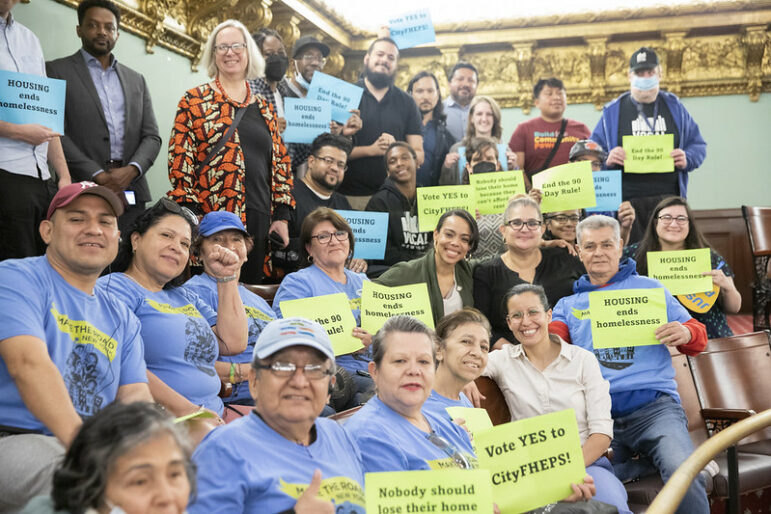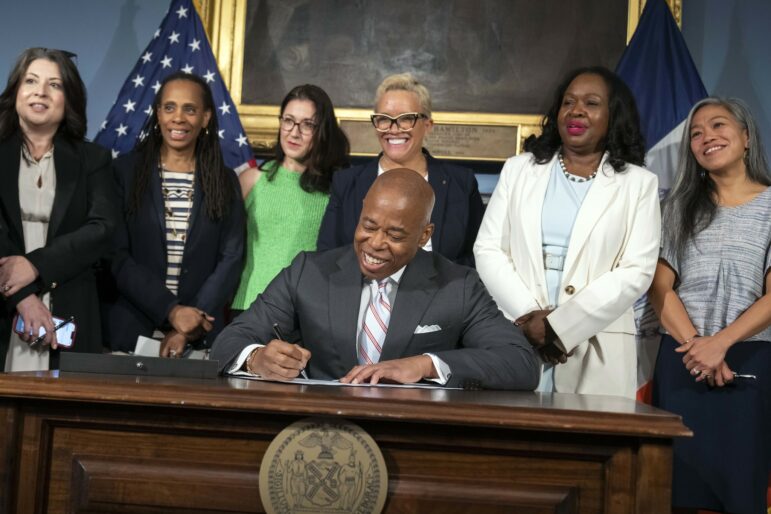With under two months left on the clock, the administration is not taking steps to fully implement a package of bills that would expand rental voucher eligibility among New Yorkers facing eviction.

John McCarten/NYC Council Media Unit
People at City Hall on May 25, rallying in support of a package of bills to expand CityFHEPs, the city’s rental voucher program. Mayor Adams later vetoed the legislation.With under two months left on the clock, Mayor Eric Adams’ administration is not taking steps to fully implement a package of bills that would expand rental voucher eligibility among New Yorkers facing eviction.
In July, the New York City Council voted 42-8 to override the mayor’s veto of the legislative package, the first such showdown since the Bloomberg administration. This ushered in a 180-day buffer period—until the week of Jan. 9—for Adams to implement reforms to the City Family Homelessness and Eviction Prevention Supplement voucher program, known as CityFHEPS.
Advocates for tenants and the homeless hoped the Human Resources Administration (HRA) would undertake rulemaking—the process of formalizing agency procedures to roll out, and comply with, all four bills. They also suggested where the city needs to spend in order to be ready for a larger application volume.
But instead, HRA is implementing a narrower, partly-conflicting rule that Adams signed in June, leaving some reforms—like broader eligibility outside of shelter and higher income eligibility—by the wayside. The city confirmed the administration is not acting on the full four-bill package.
“They’re cherry-picking here and doing rulemaking on the bills that they agree with… and not on the others,” said Christine Quinn, executive director of Win, the city’s largest family shelter provider. “And one of the most important ones they’re not doing are the ones going to people who are facing eviction.”
Launched in 2018, the CityFHEPS program allows tenants to pay part of their income in rent, up to 30 percent, while the city covers the rest, up to a fixed maximum. There were 26,500 households receiving CityFHEPS as of May, according to City Hall.
Under current rules, New Yorkers who are not in shelter have to meet strict qualifications to access CityFHEPS. But one of the bills passed in July would expand voucher eligibility to any income-qualifying household “at risk of eviction,” demonstrated with a rent demand letter—a notice signaling the impending start of an eviction case.
The Council package also lifts income eligibility from 200 percent of the federal poverty level to 50 percent of the area median income, or $63,550 for a family of three. Work requirements are eliminated, utility payment calculations are adjusted and New Yorkers can access the vouchers in a wider range of shelter systems, including those for youth.
Additionally, the package eliminates a 90-day waiting period to qualify for CityFHEPS after entering shelter, criticized as a needless bureaucratic hurdle.
But the mayor has been critical of the package since it first passed the Council in May, dismissing it as too costly and predicting that expanding eligibility would make it difficult for existing voucher holders to find apartments in the city’s tight rental market.
In June, Adams signed an emergency order plucking out and eliminating the 90-day rule. He also tweaked the CityFHEPs work requirements—increasing them for adults and decreasing them for families with children rather than eliminating them altogether, as the Council bills do.

Ed Reed/Mayoral Photography Office.
Mayor Adams signs an emergency rule on June 16 eliminating the 90-day waiting period of housing voucher applicants. He later vetoed a set of bills that would have further expanded eligibility for the subsidies.In a statement, a spokesperson for Mayor Adams touted these changes, as well as a September announcement allowing CityFHEPS holders to use their vouchers statewide, as “helping to expand the pool of housing New Yorkers in shelter can access.”
The Council legislation, they added, “makes it harder for New Yorkers in shelter to move into permanent housing at a time when there are 10,000 families in shelter that are eligible for CityFHEPS.”
According to City Hall, HRA is also in the process of updating how utility costs factor into CityFHEPS, to align with federal Section 8 voucher processes—a move “within the spirit of the City Council’s aims.”
Under Section 8, voucher holders can get a discount on their monthly rent contribution to cover the cost of utilities. But one of the Council laws, sponsored by Brooklyn Council Member Tiffany Cabán, would go a step further, ensuring that utility costs also don’t reduce the maximum rent a voucher can cover.
“We always seek to work collaboratively with the City Council, and look forward to identifying more areas of common ground to support New Yorkers experiencing homelessness, including an aggressive, citywide effort to build more housing in every neighborhood,” the Adams spokesperson said.
But supporters of the full Council package said the administration’s steps are inadequate. At a time when the shelter system is bursting, they argue, vouchers are one way to prevent people from entering the system in the first place.
There were more than 120,000 people in city shelters at the beginning of November—a population that has more than doubled in the last year—including over 65,500 recently-arrived immigrants. While CityFHEPS criteria excludes immigrants without legal status, families in the process of applying for a status, such as asylum, can be eligible.
“Right now more than ever we need to stem the tide of people entering shelters,” said Quinn of Win.
Bronx Council Member Pierina Sanchez, one of the package’s primary sponsors, said the Council remains focused on full implementation by January.
“There’s a compliance division that monitors how every administration is carrying through [on] legislation,” she told City Limits. “We’ve been asking a lot of questions of the administration regarding the different elements that we think need to change, need more resources, need to be updated.”
But the mayor has certain advantages if he chooses not to act.
In 2006, New York’s highest court ruled in favor of then Mayor Michael Bloomberg, finding that he did not have to implement legislation extending health benefits to domestic partners because it violated state and federal law. Adams has already hinted at such a defense, saying at his June veto signing that the CityFHEPS package impedes on state authority.
In response, the Council has pointed to other recent examples of CityFHEPS legislation, including a 2021 bill that increased the value of the vouchers, that passed and were implemented without incident.
But procedurally, the onus will be on the Council or an outside organization to sue the mayor over failure to fulfill his duties. Faced with an illegality defense, they would then have to demonstrate that the laws are indeed legal, according to Louis Cholden-Brown, a Council veteran who served as deputy counsel to former Speaker Corey Johnson.
“The mayor has all the power in daring the Council to take a procedural posture that it has barely done in the past two decades, and potentially irrevocably destroy their relationship,” Cholden-Brown said.
“Even if the Council is vindicated on the merits, given the challenges the social safety net is facing, it might be a hollow victory,” he added.
Indeed, staffing shortages at agencies tasked with processing voucher applications and administering payments are top of mind for the Homes Can’t Wait Coalition, a group of advocates that pushed for the passage of the broad CityFHEPS package. Members are already seeing delays on both fronts, making it hard for people to move into apartments.
“It’s bad and it’s going to get worse, most likely,” said Gabriela Sandoval Requena, director of policy and communications at New Destiny Housing, which helps survivors of domestic violence navigate their voucher applications.
The coalition has provided HRA with a checklist for successful implementation of the CityFHEPS package. Beyond rulemaking, they say the city needs to produce new informational materials and upgrade its technology systems. And, most importantly, the teams that help administer CityFHEPS need to be properly staffed.
But city agencies are newly under a hiring freeze, and face a fresh round of budget cuts in Thursday’s financial plan update. Since this time last year, three rounds of cuts have eliminated hundreds of vacant positions at housing and homelessness agencies, including 773 at HRA and 107 at the Department of Homeless Services.
City contractors also absorbed a funding reduction in this year’s budget. “If there’s additional cuts we’re going to be cutting muscle and bone now,” said Eric Lee, head of policy and planning at Homeless Services United (HSU). “Because the fat’s gone.”
Lee’s members include operators of the city’s 26 Homebase offices, which would likely see an influx of non-shelter CityFHEPS applicants under the expanded program. Already, he said, Homebase workers are juggling untenable caseloads. HSU recently surveyed 17 locations, finding an average staff turnover of 43 percent in one year.
“Homebase is already drowning,” Lee said. Funding for new hires and raises is needed to get current caseloads under control, he added, while expanding CityFHEPS would require the city to get creative—perhaps opening new Homebase offices, or funding nonprofits to focus solely on these applications.

Gerardo Romo / NYC Council Media Unit
Bronx Council Member Pierina Sanchez at a rally supporting the Council’s expansion package in July.The Adams administration says the cost of sheltering asylum seekers since the spring of 2022 has necessitated spending cuts. “With limited state and federal aid, the city has been forced to undertake difficult service reductions and other cuts to balance its budget, as required by law,” his spokesperson stated.
When it comes to the cost of the vouchers themselves, estimates vary. The Adams administration estimated the full City Council package would cost $749 million for the first year, and $17.2 billion over five years, factoring in shelter savings and assuming 47,000 new voucher holders annually.
The City Council’s estimate hovers at $10.6 billion over five years, while the Community Service Society of New York (a City Limits funder) has predicted a net cost of $3 billion over that period for newly-eligible households facing eviction.
But advocates warned that failure to spend preventatively will exacerbate a homelessness crisis of record proportion. “It’s not an inexpensive solution but it’s a good solution,” said Lee of HSU. “It preserves people’s housing and gains access for other people in shelter to get into permanent housing.”
Council Member Sanchez declined to say Tuesday if the Council would consider suing the administration over failure to implement the full CityFHEPS package, but said that “nothing is off the table.”
Quinn of Win, who served as Council speaker from 2006 through 2013, was more explicit. “There’s not a doubt in my mind that someone or some entity or multiple people at multiple entities will sue,” she said.
The impending showdown is frustrating for Patricia Glover, a member of the Urban Justice Center’s Safety Net Activists, and a CityFHEPs voucher holder. She spent 18 months in shelter before moving into an apartment with her voucher in March 2022.
“That could be so long and drawn out that people are going to fall by the wayside,” she said. “Who knows how long it can take. So that means people who are in the process of being evicted, they won’t have access to [a voucher] even though it’s on the books. And the need for housing is so urgent. It really is.”
To reach the reporter behind this story, contact Emma@citylimits.flywheelstaging.com. To reach the editor, contact Jeanmarie@citylimits.flywheelstaging.com








